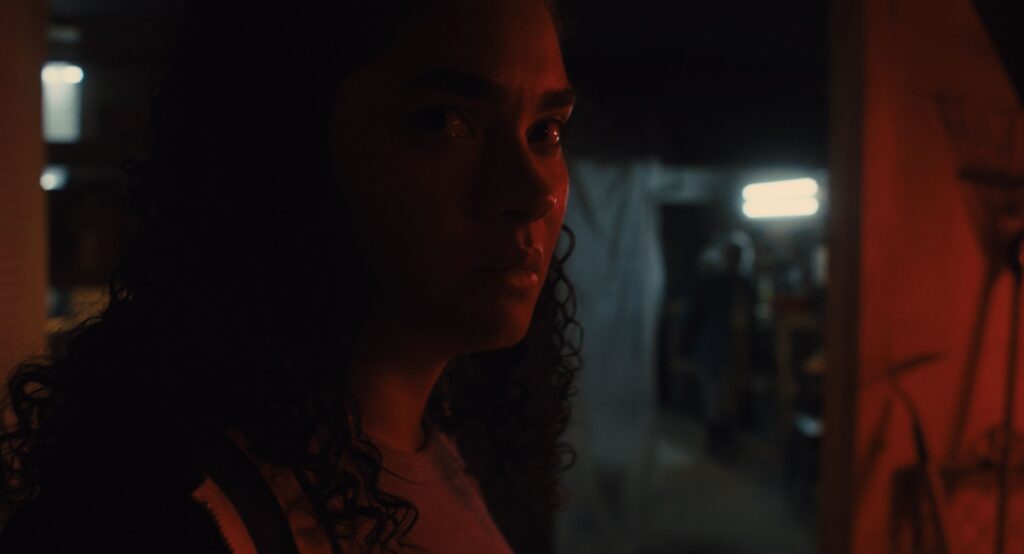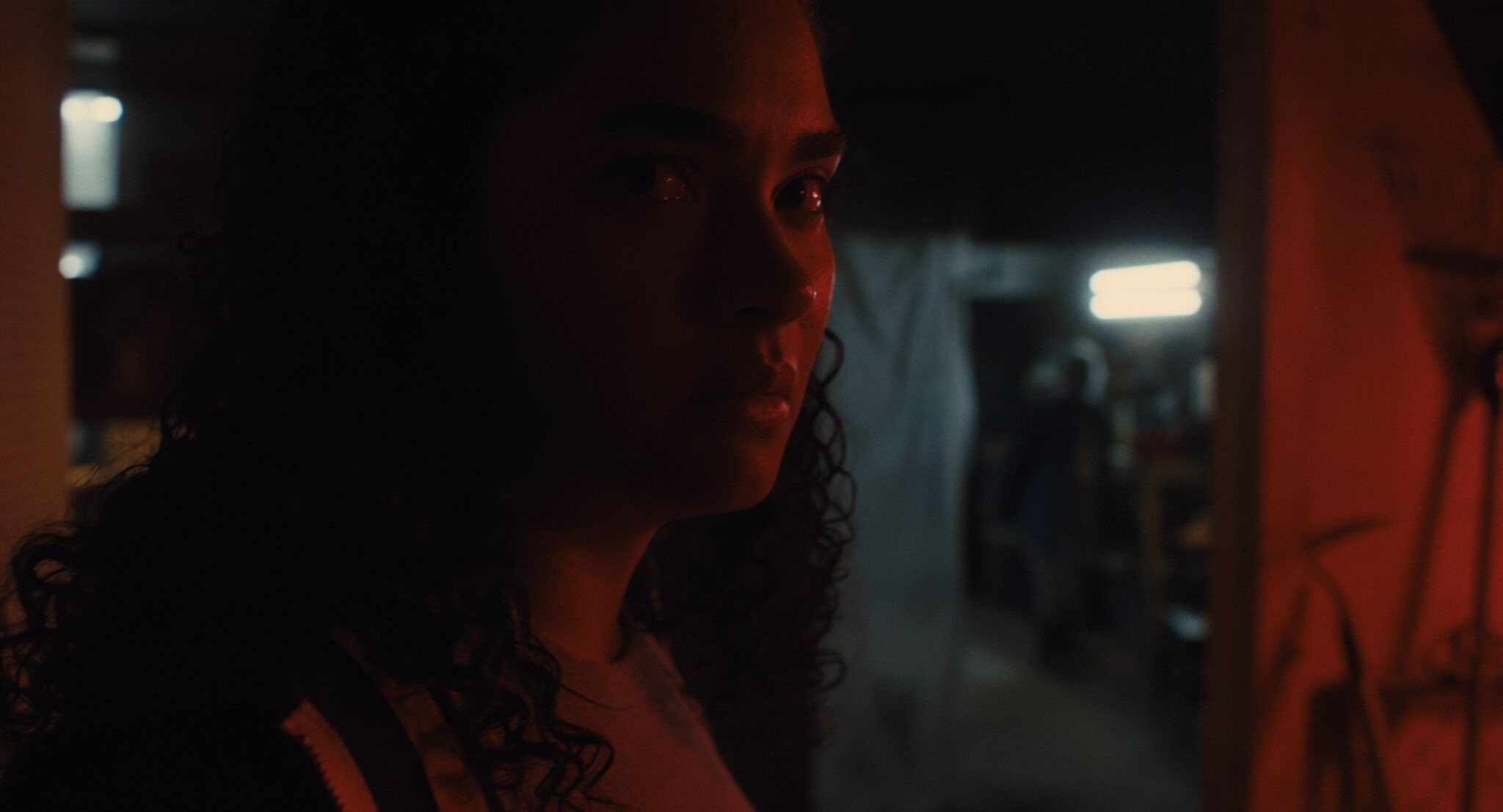
Whatever you think you’re watching, you aren’t. What you think is going on, isn’t. That’s an early lesson to take away from In Our Blood (2024), a film which uses everything at its disposal – including its shooting style – to disorientate and surprise its audience. The film opens on an upset, afraid young woman, Emily (Brittany O’Grady): whatever is troubling her, she seems to be done with it, but before we get too comfortable here, it’s revealed that this is filmed footage: it suddenly zips into rewind, showing us instantly that someone has ownership over all of this. It’s a risky strategy, beginning with what seems like the end (or more usually, about 90% of the way along), and lesser films have gone instantly astray with this approach. In Our Blood keeps a firm hold on its storytelling, however, showing itself as more than equal to this decision.
We encounter Emily again at some point before all of this, now accompanied by boyfriend and filmmaker Danny (E.J. Bonilla) and on a road trip to Las Cruces, NM. These two are making a documentary, though the subject matter is unusual: Emily is reuniting with her estranged mother Sam (Alanna Ubach), and has chosen – with Sam’s go-ahead – to make a film about it. Emily asserts that the film will be an important document, helping her to heal old wounds, but found footage fans may also note the double-distance being offered by the camera. Like The Blair Witch Project a generation before, filming offers a way of negotiating with a tough reality: it’s safer, looking down a viewfinder.
They arrive at Sam’s house – Sam, never ‘mom’ – and it turns out that they’re there for Thanksgiving. The dinner itself is given little screentime, as Emily and Danny are keen to get on with more of an interview set-up, although Sam is not instantly comfortable with this – accidentally fidgeting with her microphone, not quite knowing where to look, and so on. But she begins to explain what has driven her to contact her daughter after so long. She recently lost a friend to violence, and it led to an awakening conscience about all the things she had done wrong in her life, including her treatment of Emily. Sam openly discusses her previous issues with addiction – something which seriously impacted upon Emily’s earlier life, too – and is keen to tell Emily that she has beaten her problem, with a new job and a new outlook. Trying to head off Emily’s rising anger about their shared past, Sam suggests that she and Danny could visit the clinic where she works on the following day, as evidence that she has now made good.
However, when Emily and Danny arrive the following morning, Sam hasn’t turned up. The clinic supervisor, Ana (Krisha Fairchild) doesn’t know where she is, though she provides them with some B-roll footage for their film, just by explaining what they do there. They also get to speak to some of the addicted and homeless people who live, semi-rough, in the clinic’s vicinity. But Emily begins to fear a relapse, so they begin to try to trace Sam’s last steps. She’s not at home either, but they begin to notice strange changes to her place (which they’re able to corroborate by looking at their footage from the previous night). The more they find out, the more they begin to get the sense that they’re not welcome in Las Cruces – are they getting followed? Targeted? The film – ours, and theirs – begins to take a series of threatening, strange turns, gradually opening up a bizarre story, hidden in plain sight.
The ‘found footage’ genre, as influential as it has turned out to be, has come to be defined by a number of pitfalls and clichés. The wildly spinning cameras, the frequent (and pertinent) question, ‘Why are you filming right now?’ and above all, the use of the shooting style as an excuse for the general lack of focus and clarity has, arguably, harmed more films than it’s helped. Thankfully, things have changed: the tech is better, the genre is more self-aware, and social media has – for all its sins – led to a number of titles where the people doing the filming clearly care about the quality of their film. This brings us to the mockumentary format, which has also grown increasingly refined as time has passed, giving us a kind of planned footage, rather than found footage. In Our Blood has plenty of confidence in straddling the divide between the two. There are a handful of questionable snap-shut cuts, and a few mega-zoom shots which aren’t really needed, but for the most part, this is a plausible, smooth piece of film. The whole purpose of the film is neatly transformed by Sam’s disappearance, too, as the film itself becomes part of a puzzle: its initial function as a film about family becomes instead a primary source for finding a missing person.
It is clever, clever work, as are the earnest, believable performances which underpin it all. Further verisimilitude is granted by the film’s setting near the Mexican border. There’s no telling us what to think, but we are invited to think: casual mentions of the ‘wall’, glimpses of the problems being caused by immigration policy and policing, and all the attendant issues of crime, poverty and homelessness provide a jagged, uneasy backdrop to the film. Director Pedro Kos, whose filmography up until this point has focused on real-life social issues, has successfully brought a lot of that realism to bear on this, his first narrative film.
Alongside all of this, the film’s ratcheting sense of the strange continues to unfold. Every clue, every discovery seems to lead somewhere steadily darker. Clarity and visibility is doled out really carefully, so that making sense of these events necessarily unfolds at a steady, slow pace, with only one quick bout of exposition which really differs from this (though it, too, only tantalises other world-building beyond the limits of this narrative). In essence, In Our Blood is a highly effective, razor-sharp piece of storytelling which manages to surprise and horrify as it goes. Just as an addendum, it’s one of those films where, having followed it to its close, you find yourself going back over the dialogue, reinterpreting it in light of what you’ve learned. It’s a clever, thought-provoking and surprisingly innovative horror.
In Our Blood (2024) screens at the Fantasia International Film Festival on Wednesday, 31st July.
